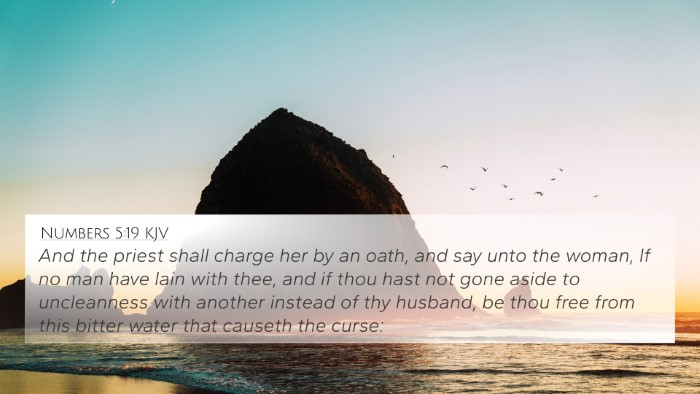Understanding Numbers 5:12
Bible Verse: Numbers 5:12 (KJV)
"Speak unto the children of Israel, and say unto them, If any man's wife go aside, and commit a trespass against him,"
Summary of the Verse
This verse is part of the Mosaic Law and outlines the procedure for addressing issues of marital infidelity within the community of Israel. The focus is on the behavior of a woman who may have been unfaithful, and it emphasizes the importance of addressing sin within the covenant community.
Insights from Commentaries
- Matthew Henry:
Matthew Henry highlights the great seriousness of marital fidelity and the importance of seeking clarity in situations of suspicion. He points out that this law reflects God's concern for family integrity and the need for a public resolution to issues of sin.
- Albert Barnes:
Albert Barnes discusses the implications of the term "trespass," indicating that it refers to both moral and ethical breaches between spouses. He notes that such situations necessitate serious examination and response from both parties, emphasizing the covenant nature of marriage.
- Adam Clarke:
Adam Clarke elaborates on the Hebrew context and linguistic elements of the verse, providing insights into the historical practices that accompany accusations of unfaithfulness. He suggests that this law seeks to protect the innocent and maintain order within the community.
Biblical Context
This verse is part of a larger section that deals with purity in the Israelite community. Understanding Numbers 5:12 requires recognizing its context within the laws given to the Israelites regarding various forms of sin, particularly those that could disrupt social and familial integrity.
Bible Verse Cross-References
Numbers 5:12 relates to several other verses throughout the Bible that address themes of marital fidelity, sin, and community accountability:
- Exodus 20:14: "Thou shalt not commit adultery." - Establishes the moral law against infidelity.
- Leviticus 20:10: "And the man that committeth adultery with another man's wife, even he that committeth adultery with his neighbour's wife, the adulterer and the adulteress shall surely be put to death." - Emphasizes the severity of the sin.
- Proverbs 6:32: "But whoso committeth adultery with a woman lacketh understanding: he that doeth it destroyeth his own soul." - Warns about the consequences of unfaithfulness.
- Matthew 19:9: "And I say unto you, Whosoever shall put away his wife, except for fornication, and shall marry another, committeth adultery." - Addresses Jesus’ teaching on marriage and divorce.
- Galatians 6:7: "Be not deceived; God is not mocked: for whatsoever a man soweth, that shall he also reap." - Indicates the principle of accountability and consequences of sin.
- 1 Corinthians 6:9-10: "Know ye not that the unrighteous shall not inherit the kingdom of God? Be not deceived: neither fornicators, nor idolaters, nor adulterers..." - Affirms the importance of righteousness in relationships.
- Hebrews 13:4: "Marriage is honorable in all, and the bed undefiled: but whoremongers and adulterers God will judge." - Discusses the sanctity of marriage and judgment against unfaithfulness.
Thematic Bible Verse Connections
The themes in Numbers 5:12 also relate to broader Biblical teachings on fidelity, the nature of sin, and the importance of confession and repentance:
- Restoration and Forgiveness:
This is a crucial theme in many Biblical narratives, where the possibility of restoring relationships after sin is emphasized.
- Community Accountability:
As seen in Matthew 18:15-17, Christians are called to hold one another accountable in love.
Inter-Biblical Dialogue
Numbers 5:12 engages in a significant conversation with New Testament teachings about marriage and sin, particularly in the light of Christ's redemptive work:
- The principles established in the Old Testament regarding fidelity carry into the New Testament's expanded understanding of grace.
- Jesus’ teachings often call the faithful to a deeper moral and ethical standard, encouraging introspection and the recognition of sin in one's own life before casting judgment on others.
Tools for Bible Cross-Referencing
For those interested in deeper study, various tools can aid in Bible cross-referencing:
- Bible Concordance: A reference tool to locate specific verses related to themes and keywords.
- Bible Cross-Reference Guides: Books and online resources that systematically connect related scripture passages.
- Cross-Reference Bible Study: Methods involving comparing and contrasting related scriptures for a more comprehensive understanding.
Conclusion
Numbers 5:12 serves as a reminder of the sanctity of marriage and the need for transparency and accountability within relationships. Its connection with other scriptures underscores the importance of fidelity and the serious nature of sin within the community of faith.
As we explore the connections between Bible verses through comparative analysis, we gain deeper insights into God's character and His expectations for us in relationships.




